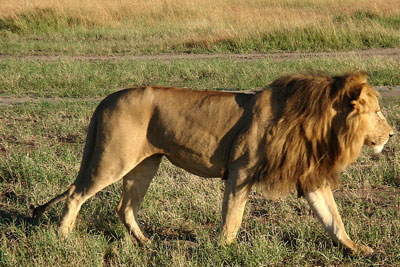How does a lion taco or lion skewers sound to you? Sounds repulsive, I know. Alarmingly, though, these are a reality. It is a rarity, but some restaurants in the United States are offering lion meat on their menus.
This is possible because African lions are not protected under the Endangered Species Act. Despite the fact that African lions do not reside in the U.S., they should be protected as a foreign species like many others -- such as tigers, rhinos, and elephants.
Because of this omission, it is within the law to breed and raise lions, often in poor conditions, to be used in roadside zoo attractions, for exotic game farms and/or to be slaughtered and sold for meat. Adult cats are kept until they can no longer breed and then sold to slaughterhouses. Meanwhile, their cubs can fetch a large sum for these exotic game farms. This is basically the African lion version of a puppy mill, and it is no way to treat the King of the Jungle. 
The King of the Jungle is in trouble worldwide. African lions have disappeared from more than 80 percent of their historic range and their populations are on the decline -- dropping by 50% in just 30 years. Only about 30,000 lions are believed to remain in the wild. Habitat loss, disease, loss of prey species, conflicts with humans, and unsustainable trophy hunting and trade in lion parts have all pushed lions ever closer to the brink of extinction.
The United States is the world's largest importer of lion parts. Between 1999 and 2008, the United States imported 13,484 lion parts equal to at least 4,000 lions.
Self-described trophy hunters pay tens-of-thousands of dollars to travel to South Africa to kill lions and bring their carcasses back into the United States. These hunts often involve captive-bred lions, raised only to be killed by foreign hunters.
Protecting African lions under the Endangered Species Act would address all of these threats. Domestic exotic game farms would no longer be permitted to raise lions in sometimes squalid conditions only to later sell them for their meat; well-heeled trophy hunters would not be able to bring lion carcasses back into the United States (drastically decreasing the market for these canned hunts); and the sale of lions bred here or abroad for captivity would be curtailed.
The organization Born Free USA and Endangered Species Coalition member organizations the International Fund for Animal Welfare, and the Humane Society of the United States have sought to address this by petitioning the Secretary of the Interior to list the African lion as an endangered subspecies pursuant to the United States Endangered Species Act. The Endangered Species Coalition and its member organizations organized support for this crucial step in protecting lions and submitted tens of thousands of comments to the public record. We await the decision from the Department of Interior.
This year is the 40th anniversary of the Endangered Species Act. This powerful law has allowed many species to recover and prevented the loss of countless others, both in the United States and abroad. Extending these protections to the King of the Jungle would help to keep lions in the wild, and off your plate.
The U.S. Fish & Wildlife Service is considering whether to protect African lions under the Endangered Species Act right now. You can support protecting lions by pledging not to support industries that trade in lions or their parts.
